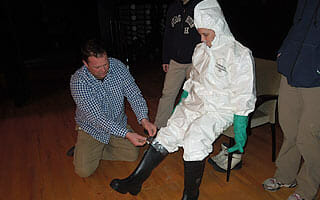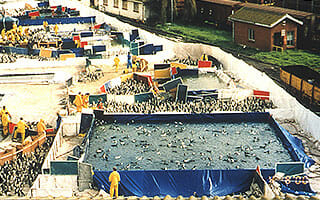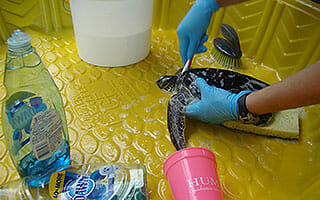Environmental Emergency Response
 A number of Detroit Zoological Society (DZS) staff complete annual recertification in a HAZWOPER (Hazardous Waste and Emergency Response) 24-Hour Emergency Response Technician Program. This training allows staff to respond to environmental emergencies and assist with oil spill rehabilitation and recovery with various species of birds, reptiles, and mammals.
A number of Detroit Zoological Society (DZS) staff complete annual recertification in a HAZWOPER (Hazardous Waste and Emergency Response) 24-Hour Emergency Response Technician Program. This training allows staff to respond to environmental emergencies and assist with oil spill rehabilitation and recovery with various species of birds, reptiles, and mammals.
 In June 2000, the oil freighter Treasure sank off the coast of Cape Town, South Africa, spilling 1,300 tons of fuel oil. The spill occurred near the largest and third largest colonies of African penguins affecting forty percent of the penguin population, and approximately 19,000 of the birds had oiled feathers. DZS animal care staff flew to South Africa to help with the rehabilitation process – cleaning and air-lifting the birds several miles up the coast for release. In addition, 3,300 abandoned chicks were reared and released.
In June 2000, the oil freighter Treasure sank off the coast of Cape Town, South Africa, spilling 1,300 tons of fuel oil. The spill occurred near the largest and third largest colonies of African penguins affecting forty percent of the penguin population, and approximately 19,000 of the birds had oiled feathers. DZS animal care staff flew to South Africa to help with the rehabilitation process – cleaning and air-lifting the birds several miles up the coast for release. In addition, 3,300 abandoned chicks were reared and released.
 In April 2010, the Deepwater Horizon oil spill happened in the Gulf of Mexico. This was the largest marine oil spill in history, and at times an estimated 2.2 million gallons of crude oil per day were leaking into the Gulf of Mexico. This oil spill affected 400 different species of wildlife, including 8,000 individual birds, 1,100 sea turtles and 109 mammals. The Detroit Zoological Society animal care staff worked with the Audubon Nature Institute providing medical care for 140 juvenile sea turtles.
In April 2010, the Deepwater Horizon oil spill happened in the Gulf of Mexico. This was the largest marine oil spill in history, and at times an estimated 2.2 million gallons of crude oil per day were leaking into the Gulf of Mexico. This oil spill affected 400 different species of wildlife, including 8,000 individual birds, 1,100 sea turtles and 109 mammals. The Detroit Zoological Society animal care staff worked with the Audubon Nature Institute providing medical care for 140 juvenile sea turtles.





